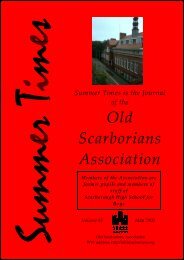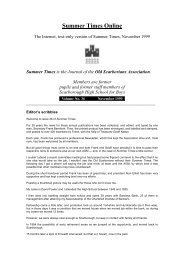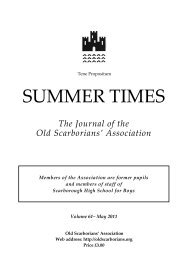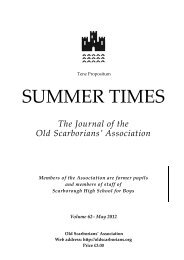Summer Times is the Journal of the Old Scarborians Association
Summer Times is the Journal of the Old Scarborians Association
Summer Times is the Journal of the Old Scarborians Association
You also want an ePaper? Increase the reach of your titles
YUMPU automatically turns print PDFs into web optimized ePapers that Google loves.
<strong>the</strong> case for <strong>the</strong> defence in fine style. He<br />
explained to both Herr Bon and me that we<br />
were carrying out work <strong>of</strong> national impor‐<br />
tance, helping <strong>the</strong> War effort by collecting<br />
metal for use in <strong>the</strong> arms industry. Having<br />
got over my surpr<strong>is</strong>e at that brilliant expo‐<br />
sition, <strong>the</strong>re was ano<strong>the</strong>r one to come from<br />
Herr Bon. He proceeded to reprimand us<br />
in no uncertain way for not wearing our<br />
caps when carrying out such a worthwhile<br />
task. Our war work in th<strong>is</strong> field came to an<br />
abrupt end.<br />
Hindsight provides a more real<strong>is</strong>tic assess‐<br />
ment <strong>of</strong> our schooldays through compari‐<br />
son with today’s school systems and devel‐<br />
opment <strong>of</strong> our youth. Having had three<br />
daughters with experience <strong>of</strong> State school‐<br />
ing, as pupils and teachers I have great<br />
difficulty in reconciling our schooling with<br />
that provided today. I have to accept that I<br />
have a very real generation gap or two!<br />
I record that <strong>the</strong> High School led by a great<br />
headmaster in Mr Marsden gave my broth‐<br />
ers and myself a very good grounding for<br />
life. Ge<strong>of</strong>f went on to lecture in metallurgy<br />
at York College, Vernon became <strong>the</strong> County<br />
Architect at Northallerton, and I served for<br />
52 years in and with <strong>the</strong> RAF.<br />
Thank you SBHS.<br />
HOV’s WAR MEMOIR<br />
The World War<br />
II experiences<br />
<strong>of</strong> an infantry<br />
<strong>of</strong>ficer<br />
by Major<br />
George<br />
Reginald<br />
Hovington<br />
Edited by Michael Rines<br />
Continued from Volume 44<br />
CHAPTER 8: SICILY 1943<br />
The day eventually arrived when we<br />
41<br />
boarded a liner at Suez and sailed through<br />
<strong>the</strong> Canal to Port Said, where, after a day’s<br />
pause, we set out to sea. Within 24 hours,<br />
<strong>the</strong> whole convoy was assembled with its<br />
appropriate naval cover. Then came a<br />
storm, with waves as high as we had en‐<br />
countered rounding <strong>the</strong> Cape <strong>of</strong> Good<br />
Hope. We were told that <strong>the</strong> invasion, be‐<br />
cause <strong>of</strong> <strong>the</strong> wea<strong>the</strong>r, had been postponed<br />
for a day, and we sailed round and round,<br />
buffeted by <strong>the</strong> waves, <strong>the</strong> winds and <strong>the</strong><br />
rain.<br />
For some years we had been friends with<br />
artillery and sapper <strong>of</strong>ficers, particularly<br />
those who were attached to us, and I<br />
watched <strong>the</strong> flares and fires over Sicily<br />
from <strong>the</strong> top deck with one <strong>of</strong> <strong>the</strong>m, Oliver<br />
Johnson, as we made our approach through<br />
<strong>the</strong> night. We were due to land at dawn,<br />
but <strong>the</strong>re were so many soldiers in <strong>the</strong> sea<br />
that dozens <strong>of</strong> times <strong>the</strong> liner hove to, and<br />
<strong>the</strong> sailors took out boats to rescue <strong>the</strong>m.<br />
One soldier murmured to me as he drank<br />
h<strong>is</strong> hot rum that <strong>the</strong> American aeroplane<br />
pilots had released <strong>the</strong> gliders far too soon.<br />
As soon as <strong>the</strong> flak came up <strong>the</strong>y were <strong>of</strong>f!<br />
Our landing point was a beach just south <strong>of</strong><br />
Augusta, and <strong>the</strong> liner anchored about two<br />
miles <strong>of</strong>f shore. Then began <strong>the</strong> hazardous<br />
operation <strong>of</strong> sliding down netting placed on<br />
its steep sides onto <strong>the</strong> decks <strong>of</strong> landing<br />
craft. The sea was still rough and <strong>the</strong> liner<br />
and <strong>the</strong> landing craft never seemed to r<strong>is</strong>e<br />
or fall toge<strong>the</strong>r in <strong>the</strong> swell, nor was it pos‐<br />
sible to keep <strong>the</strong> landing craft within a yard<br />
<strong>of</strong> <strong>the</strong> side <strong>of</strong> <strong>the</strong> liner. Consequently, a few<br />
men fell between <strong>the</strong> crafts and were lost.<br />
I had been detailed to be <strong>the</strong> first in <strong>the</strong><br />
Battalion to go ashore from <strong>the</strong> landing<br />
craft, which went aground about eighty<br />
yards from <strong>the</strong> shore. Officers were armed,<br />
just like <strong>the</strong> troops, with a rifle so that <strong>the</strong>y<br />
could not be picked out from <strong>the</strong> o<strong>the</strong>r<br />
ranks. We also carried <strong>the</strong> same hand gre‐<br />
nades, blankets and emergency rations, but<br />
unlike <strong>the</strong> men, we also had a p<strong>is</strong>tol, so <strong>the</strong>















